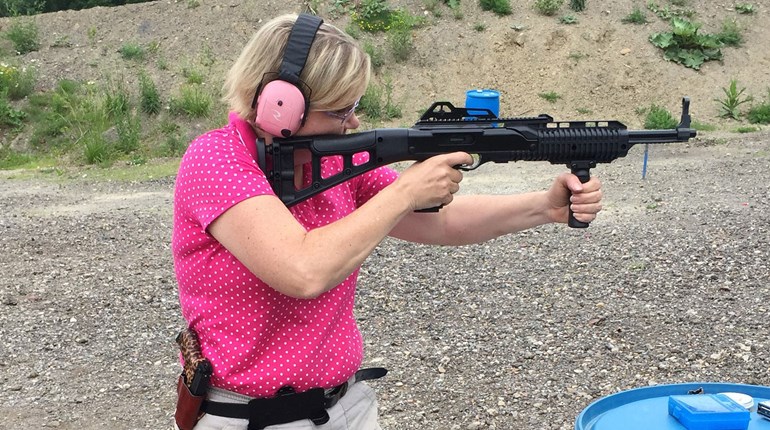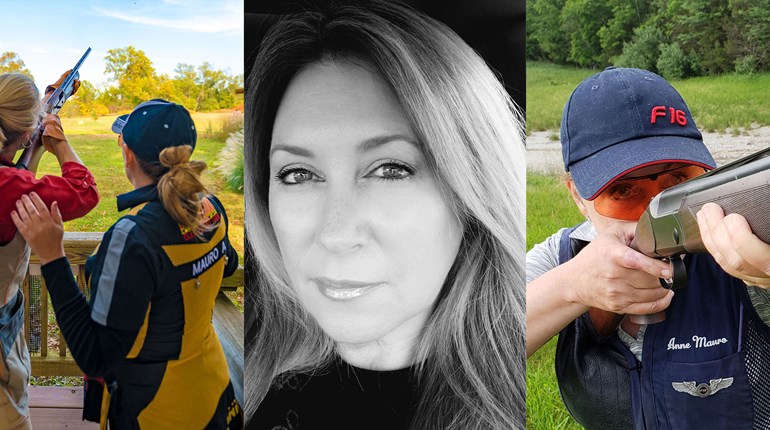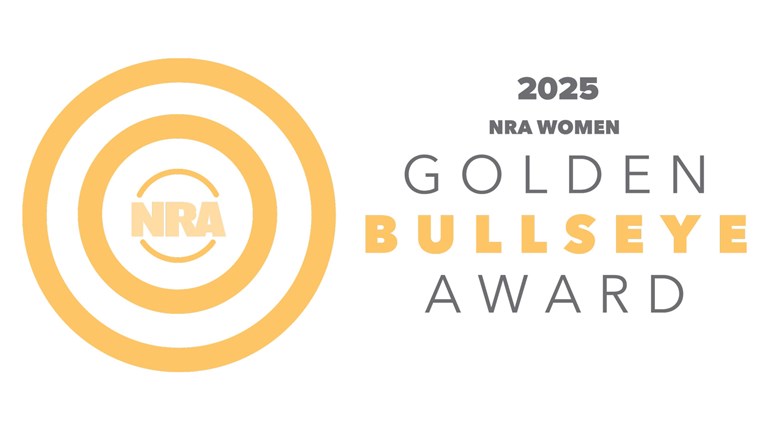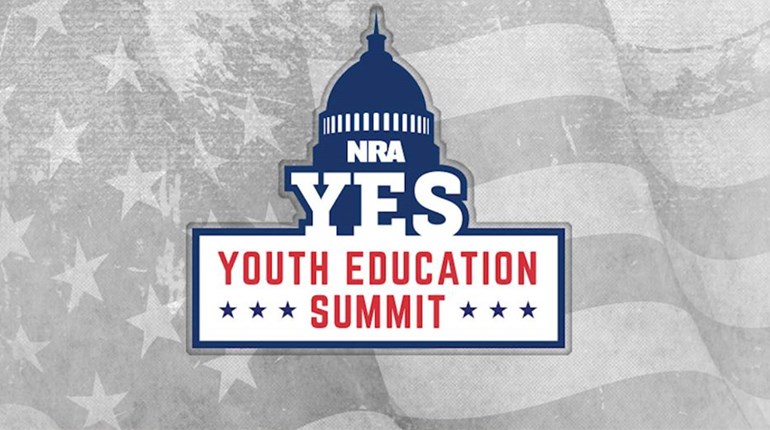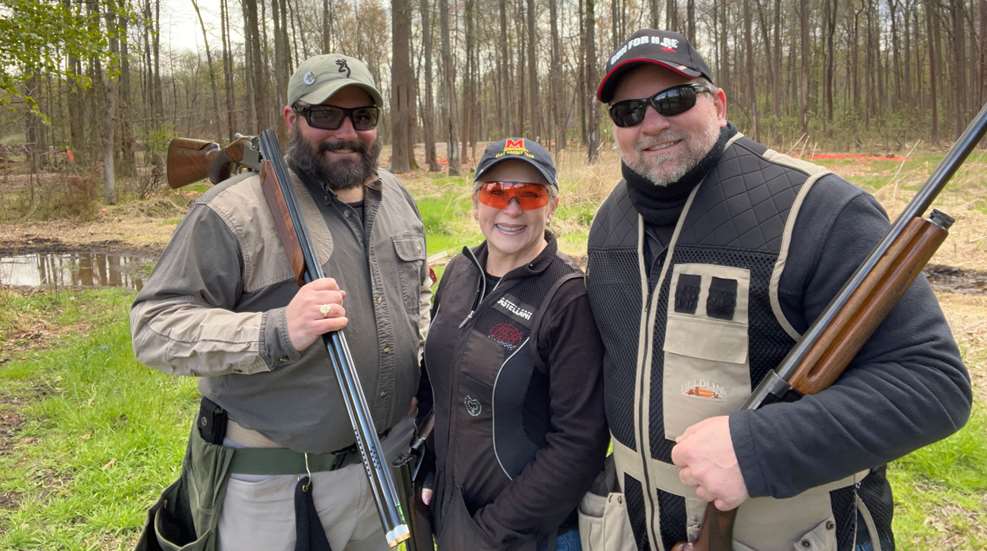
Last Spring I had the chance to get a personalized experience on a sporting clays course from Anne Mauro, the renowned shotgun sports team coach for the University of Maryland. The invitation came through friend and content creator Charlie Cook (Riding Shotgun With Charlie), who brokered the gathering after filming a show with Mauro.

Like most shooting sports, clays is one of those activities you don’t have to be good at to enjoy. I have considered myself a contender on the field, but that also comes with admitting Cook has mopped the floor with me the last few times we’ve decided to yell, “pull!”
So off we headed to M&M Hunting & Sporting Clays in Pennsville, N.J., a well-kept, family run business which, coincidentally, was where I learned to shoot clays in the mid 90s when I was a teenager.
We jacked up our pants as we hopped out of my Subaru, and sidestepped to where Mauro was parked. The car door swung open and Mauro greeted us at about chest height. Mauro claims she’s five foot two inches, generously allowing herself a slight bit of extra height, but admitting to the white lie. "What’s a quarter of an inch amongst friends?" she posed. Mauro is a giant, having designed the Syren shotgun for Ceasar Guerini and the F16 Intution for Blaser, who holds with grace, wisdom and experience.


On the field we soon learned to mind our P’s and Q’s. Chuckling like mischievous schoolboys at one of the very few missed targets with which Mauro engaged, she darted her eyes our way and scolded us. “Don’t laugh.” The only appropriate response was an immediate and sobering, “Yes ma’am.”
Throughout the day we learned a lot from Mauro. Some lessons were refreshers, but there was quite a bit of new knowledge imparted to us.
Here are my six key takeaways:

Sporting Clays is Not Golf
Mauro says she loathes that sporting clays is often referred to as “golf with shotguns.” Except for the fact that it’s an outdoor activity, she’s correct in stating there’s nothing “golphy” about shooting clays. I assured her from that day forward, we’d forever refer to golf carts as “shotgun shooting carts.”
Remember the Fundamentals
When we stepped into the shooting box, Mauro simply observed us. I shot first and managed to break the target. “No commentary?” I paused. Mauro simply ordered, “Again.” Breaking the action open, “Again?” I queried. “YES. Again.” Naturally it did not take too long for a lost bird to find its way across my bead. Mauro instructed me to stay on top of my follow through, reminding me that there’s no reason to rush to break open the gun.
“Every few shots, every time you step into the box, it’s important to review the fundamentals,” she told us.
Make a Plan
Mauro stressed the importance of knowing the speed and angle of the target. We also received pointers on where in the target window we should shoot. For example, if it were a straight up target, like a teal, do we wait for the apex?
Mauro said she favored falling targets, which came as a surprise because that technique had been instilled in me as taboo. “You shoot the bird where you can see it best,” she explained, adding that shooters need to make a plan before calling for the bird—which is all going to depend on its presentation. She ran off some options. “OK, is it going to be that? Are they going to be too different? How far apart are they going to be? The two closer together? Am I going to take one on the rise and the other on the draw?” Or, she continued, “Is it going to be I can take one and then move right over to the next bird?” Based on the timing, and its presentation, she said, you have to see it to be able to tell. But from there, that’s where you make your plan. Visualize and attack!

Keep Both Eyes Open
Transitioning from shooting with one eye closed, focusing on the bead, to both eyes open and watching the target, did not come easy to me. This process took years, and I’m still working on it. I typically develop my frame of reference by mounting the gun, creating a little snowman with the mid bead and front bead with my left eye closed, and once that relationship is established, open both eyes and focus on the target.
Mauro had some advice for Cook, who is cross dominant.
“There are a couple of little tricks to do with your glasses and a little piece of tape,” she explained. “A lot of times we just use the regular Scotch tape,” she said, motioning to tape it an angle across the lens, “which will block the targets that are off to your left and right for that split second to allow the right eye to become the dominant eye. Then everything's back in the picture and you keep both eyes open,” she explained.
Gun Mounting
My shooting style has always been to have the gun ready and mounted on my face, as I believed it to give me an advantage.
However, Mauro’s technique was different. She entered the box, mounted her gun, established the path in which she was going to swing her gun, then pulled her face completely away from the comb of the stock. Mauro called for the bird, tracked it, reconnected with the comb, and then fired away. I watched her do this several times before asking about it. She explained that on certain stations that could be done. There was a lot of real estate to see where the target was going to go. By keeping the face away, we’re widening our view that much more, and then when ready, connect, swing, fire, and follow through.

Shooting Sports Equals Togetherness
Cook and I talked with Mauro about the “Olympic rings” of the Second Amendment community: the tactical group; the handgunners; the hunters. The hunters don’t want to carry concealed; the tactical people don’t want to hunt. Then there’s the everygun person who does it all. And Cook joked that “... No one knows what the shotgunners are doing!”
Mauro arrived at what I consider a principal kernel of being in the shooting community: “It starts to bring everybody together; people are more aware. We all tend to be in our own little inner circle with what we do within an industry or sport,” she said. “… To pull all this together, it just makes the family bigger—which is awesome. Everybody's willing to share what they know, or who they know, what they've been through, learning different parts. And it's exciting!”
Our time with Mauro was great. After getting royally but respectfully schooled by her at M&M’s, we headed to a Jersey diner to break bread. Mauro was professional at all times when sharing her knowledge. Luckily she’s accustomed to instructing boys and men, dealing with our attention spans, and our idiosyncrasies. Patience is a virtue.
While we ate, we postulated about our day, and reviewed what we learned. We talked about the firearm community and, again, pulling together the different circles of people to learn from and share with. I don’t fancy I’ll be a world class clays shooter anytime soon, but I did pick up a thing or two from Mauro, besides her friendship. All I had to do was keep an open mind and remember to say, “Yes ma’am.”
See more of the highlights of our day here.
John Petrolino is a US Merchant Marine Officer, writer, author of Decoding Firearms: An Easy to Read Guide on General Gun Safety & Use, USCCA certified instructor, and NRA Certified Pistol, Rifle and Shotgun Instructor. You can find him on the web at thepenpatriot.com on twitter at @johnpetrolino on Facebook at facebook.com/thepenpatriot/ and on instagram @jpetrolinoiii













